How to Use LSI Keywords in Your Content to Drive Traffic
Share
Using LSI keywords you can boost your SEO strategies and craft your old content into the search engine results page (SERP). As a result, keywords have become an essential part of Google’s ranking factors. In addition, using LSI keywords can improve the context of your content and your search visibility. It is well-known that Google emphasizes understanding the context of any piece of content more. That’s how latent semantic indexing is used in SEO, and the best LSI keywords in your content can drive traffic.
Using LSI keywords helps search engines better understand your content, increasing your content’s relevance for a specific topic and thus increasing its ranking.
In this article, we’ll learn everything you need to know about LSI keywords to improve your SEO, attract more people, and drive relevant traffic to your website.
What Are LSI Keywords?
Latent Semantic Indexing (LSI) keywords are words related to a main keyword and semantically relevant that search engines use to understand a webpage’s content deeply. They are usually the highlighted words and phrases in the search result descriptions and are considered the most relevant to the original keywords.
As a result, LSI keywords yield more relevant and accurate search results, boost search engine rankings, and refresh old web content.
LSI works with the help of partial application of Singular Value Decomposition (SVD). At the same time, SVD is a mathematical operation that reduces a matrix to its constituent parts for simple and efficient calculations.
As of now, we have understood what LSI keywords are.
Let’s move to the next step which is the ways of finding the right LSI keywords for your niche.
Best Ways To Find The Right LSI Keywords for Your Content
There could be multiple ways to find the latent semantic indexing keywords to improve the SEO score and drive organic traffic. But, here, I’m giving you the expert-approved tips to find the LSI keywords.
Have a look!
#1. Google Suggestions
When you search for a term in Google, in this case, we’ll use “black shoes” as an example; Google will display relevant results for that particular keyword or phrase. Moreover, it will also return pages relevant to words similar to that term. These appropriate, related words are known as LSI keywords.
How does Google display LSI keywords?
Here is an example of how LSI (Latent Semantic Indexing) keywords
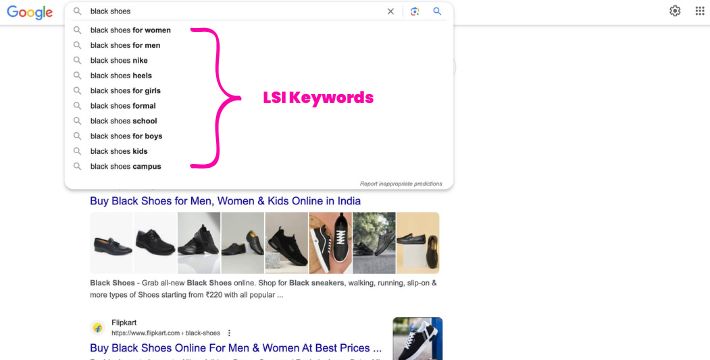
Image Source – Google Search
Look at the results for “black shoes,” and you’ll see many different words highlighted in the description of each web page, and these are the LSI keywords. Because of this reason, keyphrases in Google’s algorithm have been determined to be related to the original search phrase.
Google returned “black shoes for women,” “black shoes for men”, and “black shoes nike ” as a few LSI keywords search terms.
Having a good meta description is valuable. You should use your keywords in the description and expand the description with at least one LSI keyword phrase to get more credibility from Google.
#2. Through “People Also Ask” Suggested FAQs
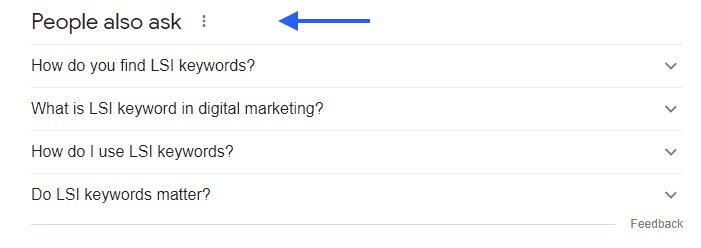
Image Source – Google Search
The “People Also Ask” section is a unique feature of Google search to find related keywords. This is a list of questions people frequently ask about a particular topic. You can use these questions to develop ideas for your content and include those questions as headers with answers in an FAQ section of your content.
#3. Using Google Keyword Planner
Google Keyword Planner
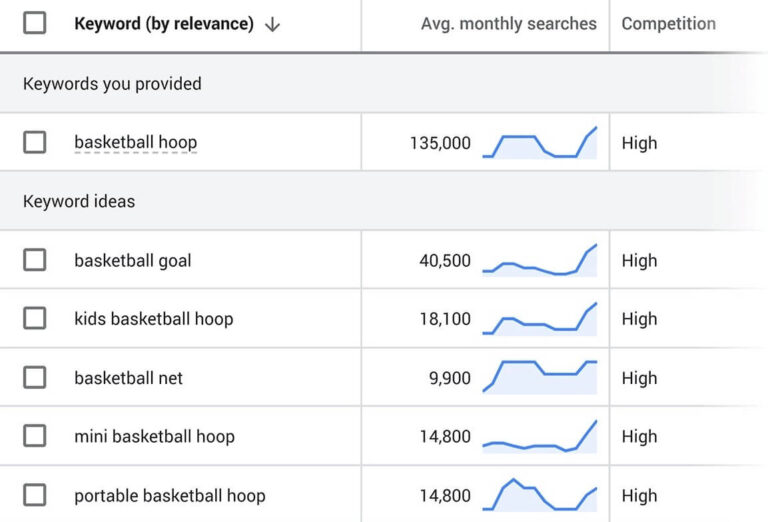
Image Source – Backlino
Google also provides the Keyword Planner as a keyword tool built to help web marketers identify appropriate keywords that can also assist in optimizing ad spend. This tool lends itself to determining LSI keywords.
For example, suppose you google the search term “basketball hoop”; you will find the following LSI keywords:
-
Basketball goal
-
Kids basketball hoop
-
Basketball net
-
mini basketball hoop
#4. Through Google’s Related Searches
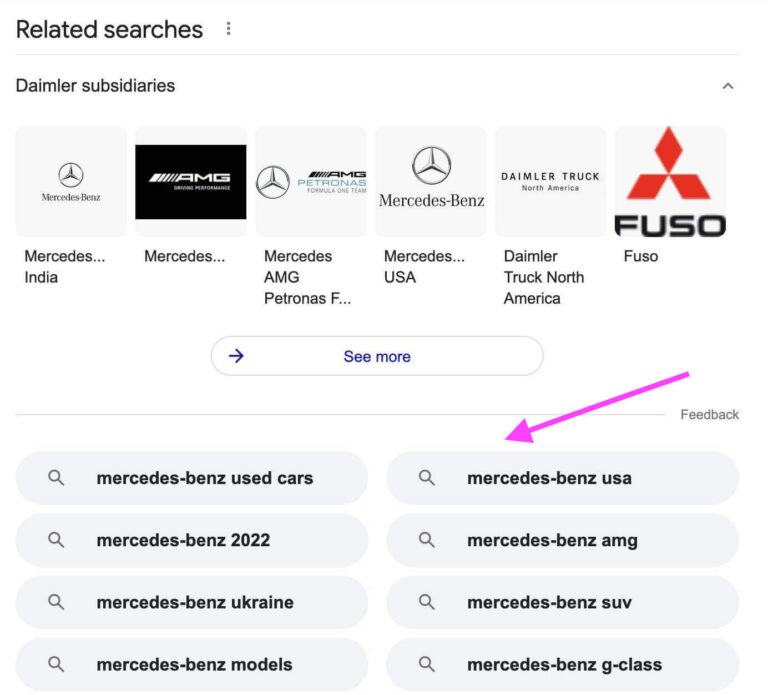
Image Source – Ahrefs
You can find related LSI keywords in the “related searches” section at the bottom of Google’s search results page. Google suggests keywords every time you search for something.
So, if you scroll down on the search engine results page, you can view many related terms at the bottom. It shows you a list of associated words that people have searched for. You can use these terms to help you develop ideas for your content.
#5. Competitor’s Title, Meta Descriptions, and Content
Using unique titles, keywords, and meta descriptions are always the best practice. It will help your website appear more on exact match searches and increase your ranking on SERP.
In addition, you can have multiple LSI keywords on your meta description since these can help users and search engines to understand your content better.
For Example, if you are a SaaS business and want to get ahead of your competitors. It is vital to check your competitor’s title, meta descriptions, and most importantly the content.
Here, you can read our comprehensive guide on creating a unique content where you will know how to create a killer title, meta descriptions, and content to outrank your competitors and increase sales using SaaS content strategy.
Perfect Example of Meta Descriptions by Searchmetrics
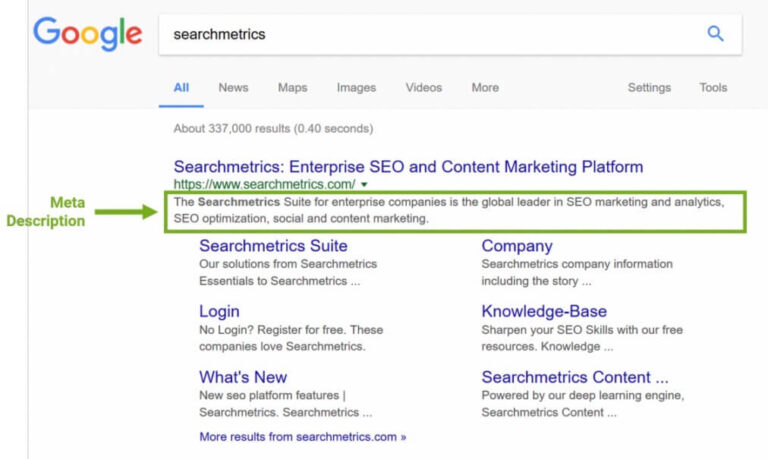
Image source – Searchmetrics
#6. Using Paid Keyword Tools
Now, it is time to know how you should use LSI keywords in the content to drive maximum traffic by using the best keyword research tools in the digital industry.
Keyword Research Tool by Ahrefs
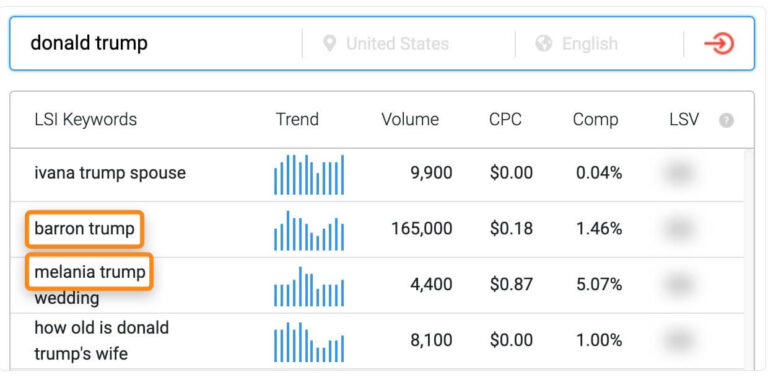
Image Source – Ahrefs
You can also use a keyword generator tool by Ahrefs besides the Keyword Planner to find LSI keywords for a search phrase. For example, Ahrefs helps you to generate hundreds of LSI keyword ideas for Google, Bing, YouTube, and Amazon, complete with monthly search volumes and Keyword Difficulty scores.
Keyword Magic Tool by SEMRUSH
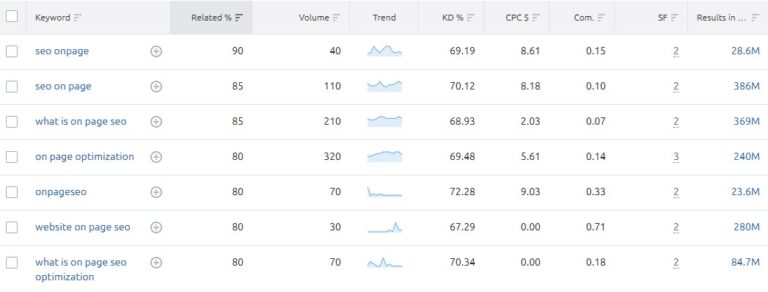
Image Source – Staymeonline
Keyword Magic Tool by Semrush is another type of keyword research, whether long-tail or LSI. Although SEMrush is an excellent tool that costs $99.95 per month. Enter your seed keyword in the SEMrush keyword magic tool and hit enter.
Moz Keyword Explorer
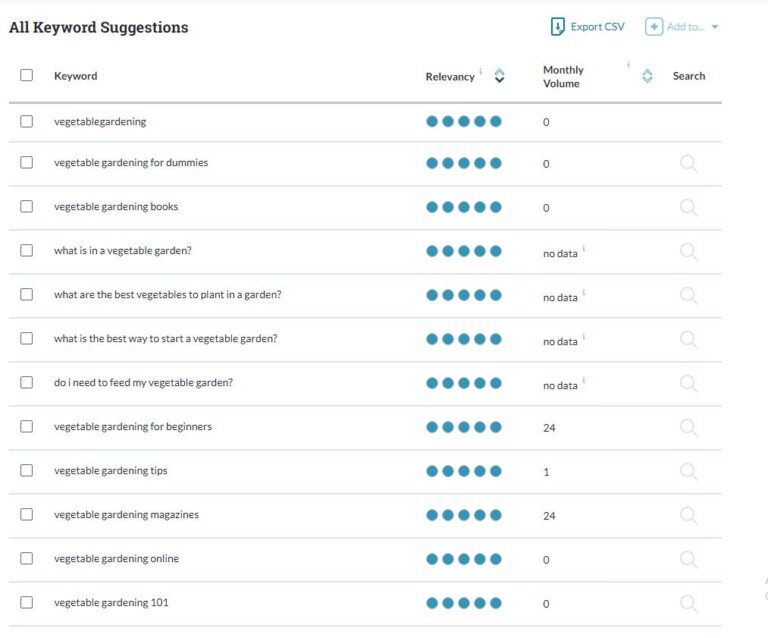
Image Source – Scribly
Moz Keyword Explorer works more like a typical SEO tool in that you can discover more LSI keywords. Once you access Moz keyword explorer, you can quickly enter your seed keywords and find more relevant keywords.
How To Add The Best LSI Keywords To Drive SEO Traffic
Once you find the complete list of keywords, then the next step is to find their search volumes and competition level. Prepare the list only with those keywords which have high search volumes and low or medium competition.
You need to add only one time the relevant LSI keywords in your content naturally. Always remember, never use a single LSI keyword twice. Avoid this to get penalized.
Example,
According to the case study by 99signals, which explains (how to Boost Organic Traffic to an Old Article by 146% in 30 Days) LSI is a crucial element to keep in mind while optimizing keywords on a site.
These following images show more on the studies conducted to boost SEO traffic through content marketing with the help of LSI.
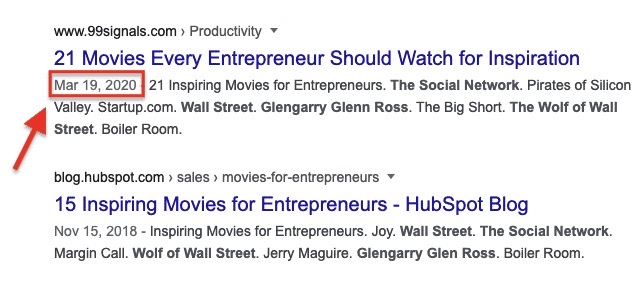
Image Source – 99signals
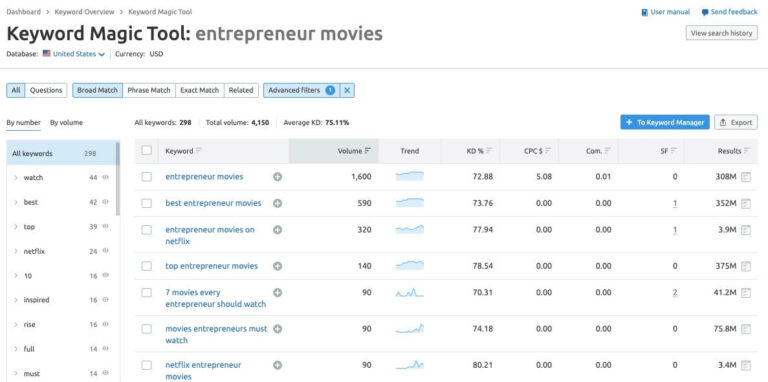
Image Source – 99signals
Strategies For Using LSI Keywords That’ll Boost Your SEO
Pick The Right LSI Keywords Suited For Your Topic
You must identify and choose the top LSI keywords that suit your topic. Always try to have your main keyword in the first intro line, then use the most critical and relevant LSI keywords within the top half of your article body. You should change your article structure to achieve this.
LSI Keywords Are Not Just Synonyms
LSI keywords aren’t synonyms but words often found together because they have the same context. Therefore, LSI keywords will ensure your site ranks for semantically related searches instead of just your target keyword. Investigate Other Google searches related to your topic.
Do a Google search for your target keyword the bottom of the search results page will usually yield a slew of related searches that effectively tell you what Google considers relevant to the topic. This allows you to crowdsource LSI keywords based on actual search phrases.
Observe Total Monthly Search Estimate
Finding the best LSI keywords for your copy can be challenging because some suggestions may be better suited for a different post. So first, look at the total monthly search results to decide whether it’s worth incorporating the relevant guidance into the original article.
If you encounter keywords that don’t fit your page during your research, you can still note them to use on other pages to improve your website’s overall SEO.
Put LSI Keywords on Your Web Page
You should add your LSI keywords to the same places you would add your main keyword, including.
-
Meta title and meta description
-
Headings – H1, H2, H3
Image alt tags -
Throughout the body text
Study and analyze user experience.
Without ruining the reader’s experience, you want to include enough related and relevant words to make the context of your web page immediately clear to Google and other search engines. To do this effectively, you must include related keywords while maintaining a consistent, natural-sounding, and easy-to-follow tone in your content.
Some Other Ways LSI Keywords Can Help With SEO In Your Content to Drive Traffic
Other ways to use LSI keywords that can boost SEO traffic are as follows:
-
Pay Per Click (PPC) Campaigns: Use the relevant LSI keywords to strengthen when and how your ads appear.
-
Content quality: Always reduce the number of times the exact phrase is in your content. Moreover, This can increase the readability of your article, which in turn leads to higher page views, a ranking signal to Google.
-
Meta descriptions: Use LSI in your meta descriptions to help search engines to know what your content is about.
-
Image optimization: Use LSI keywords to rename the image each time while using it, and it can help you to optimize it for each piece of content you write.
Benefits Of Using LSI Keywords
LSI keywords-driven content can lead to several benefits, such as:
-
Higher Search Engine Rankings
-
Increased Content Credibility
-
Improved On-Site Browsing Time
-
Decreased Bounce Rates
-
Improve link building
In your description, Google will prioritize you Using your main keyword and an LSI (Latent Semantic Indexing) keyword phrase. Using LSI Keywords in the description, Your search results will improve and rank higher.
Disadvantages of Using LSI Keywords in the Content
-
If you overuse or stuff LSI, your content may start to sound repetitive.
-
Using too many LSI keywords can hurt your SEO results because search engines view your content as keyword stuffed.
-
If you use too many different LSI keywords in your content, it will be difficult for readers to follow along.
Final Word
Your ultimate goal should be to provide readers with clear, concise, and valuable information that helps them find the answers and solutions. Use the tools and techniques listed in this article to find profitable relevant keywords and optimize your content to get maximum traffic. While there are several latent semantic analysis tools and keyword suggestion tools to generate LSI keywords today, you must understand which works best in SEO. I hope this list will be helpful for you to find relevant and high-quality LSI keywords for your web content. If you are still within the early stages of your content creation, LSI tools that provide not only LSI keywords but give you access to more information, as well as keyword and topic suggestions, can be helpful for you. Optimizing content with LSI keywords is an advanced way to drive valuable traffic.
Frequently Asked Questions (FAQs)
1. Is using LSI in content still important?
Google uses Latent Semantic Indexing (LSI) to understand the content better and give more relevant search results.
2. How many times should I use LSI keywords?
Using LSI keywords in your article improves its contextuality and provides SEO advantages: They help your web pages rank higher in SERPs. In addition, using up to 10 LSI keywords in your web copy enables search robots to understand the page better.
3. What are LSI keywords in SEO examples?
LSI (Latent Semantic Indexing) keywords are words related to a main keyword and seen as semantically relevant. If your page’s primary keyword is ‘Link Building,’ then LSI keywords would be things like SEO,” “SERP,” “Organic traffic,” or “digital marketing”, etc.
If you need a service for driving organic revenue, call us and book a free consultation today!
